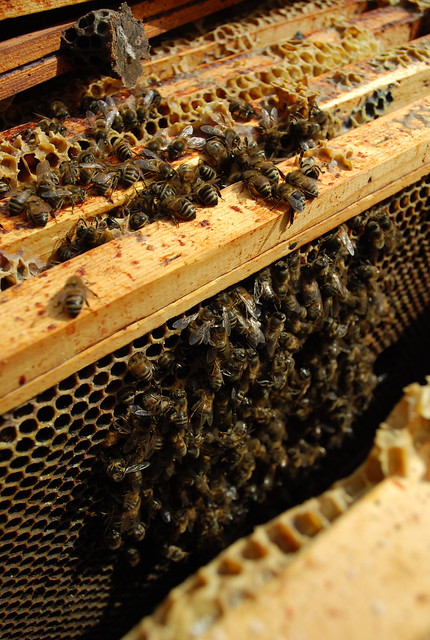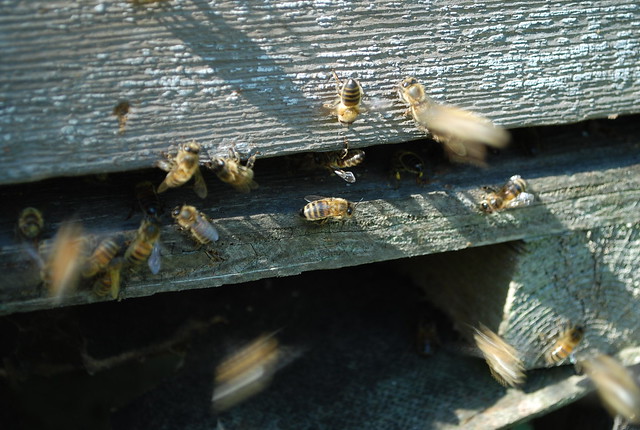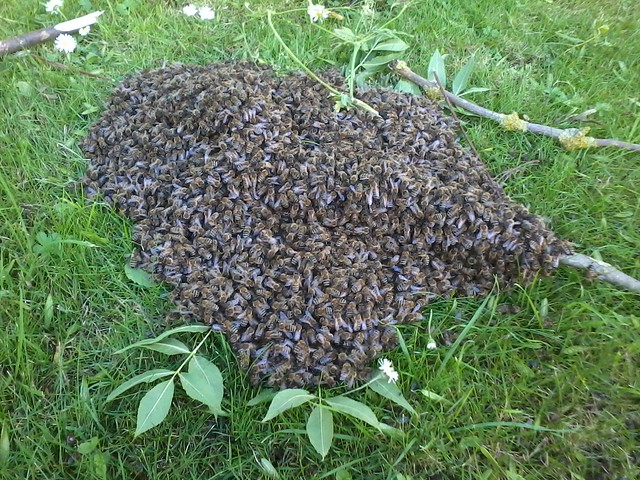 My personal ones, that is. Around the start of April, on about the first sunny day of the year, I wandered down the garden to see the bees, who had been very very quiet. And when I saw none, I went closer, and tapped, and breathed into the entrance, and put my ear to the side, and heard nothing. So I took the top off, and found them dead, which was sad. As you see from the pic (and from this one) they hadn't just disappeared - this was no colony-collapse-syndrome stuff - they'd just died in-place. I put it down to starvation - it was a long cold spring. I thought I'd left them enough stores, but everything was eaten out, apart from the crystallised rape honey which is no use.
My personal ones, that is. Around the start of April, on about the first sunny day of the year, I wandered down the garden to see the bees, who had been very very quiet. And when I saw none, I went closer, and tapped, and breathed into the entrance, and put my ear to the side, and heard nothing. So I took the top off, and found them dead, which was sad. As you see from the pic (and from this one) they hadn't just disappeared - this was no colony-collapse-syndrome stuff - they'd just died in-place. I put it down to starvation - it was a long cold spring. I thought I'd left them enough stores, but everything was eaten out, apart from the crystallised rape honey which is no use.
So, I was sad. But now, they're back. Total inaction wins again.
Here you see them frolicking about in the sunshine. About a week ago there were a fair number sniffing around the hive, but then they weren't, and we had a week of downpours. And then three days of sun, and the bees returned, or they are a different lot who knows.
Someone else's bees have swarmed, and they've decided my hive would be a splendid place to live. Of course, they're right. Its a bit of a shame I didn't get round to clearing out the bee corpses from inside, but I'm sure the bees themselves are quite capaable of doing that. It doesn't look like there are many of them in that pic, but there are loads. Here are more.
Update: More bees vicar?
Last Sunday [2013/06/23] I was at the "cream teas on the village green" and someone said "there's a swarm of bees in the churchyard". And so there was. Unusually, on the ground, but only because it was so windy that the branch they were on had snapped off. So I went rowing, and came back at 7:30, and picked them up and dumped them in a box and took them home and put them in my #2 hive. They seem quite happy.
- Log in to post comments




Like everywhere else it's been cold for months. Spring is way behind. But, the few colonies I still have are, amazingly (because they're on Dartmoor and mostly it's been too cold to open them) booming. Why? Less bees to compete with plus dry weather and dandelions prolonged by the cold weather? Probably. Resestant to the mite? Possibly. That they're swarmers as a result of both possibilities? What bees I have do seem to boom and bust these days.
But, whatever the cause, to see a box packed with bees just seven weeks from when it was cold beyond belief for the time of year is just amazing.
[Odd indeed. All around us now the rape is in fine bloom, which will perhaps help mine for a bit -W]
Rejoice!
Deces Mellifera Apis
Mal diagnosis
letal halitosis